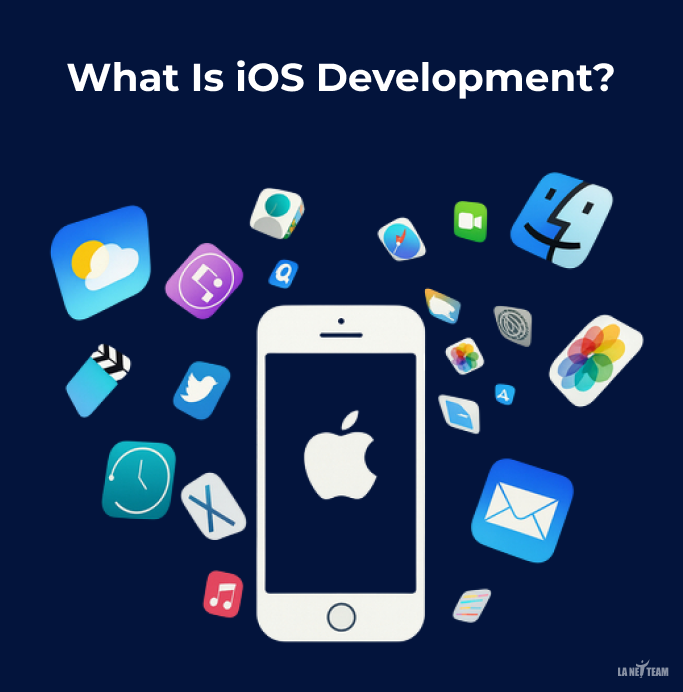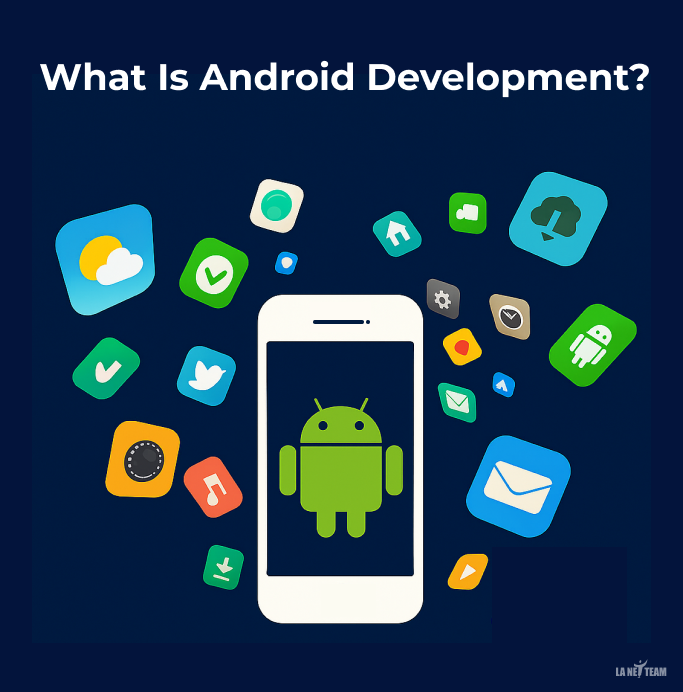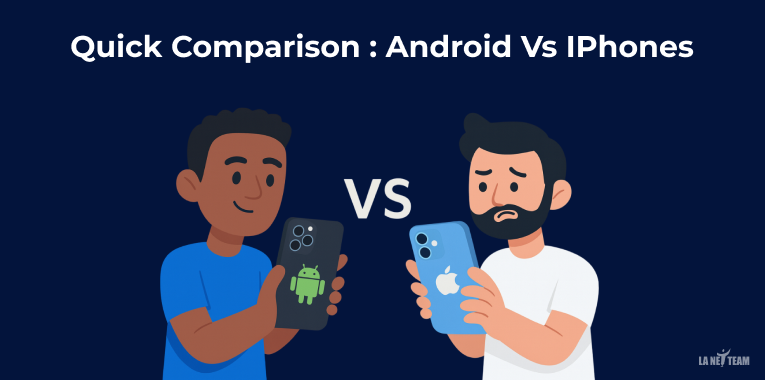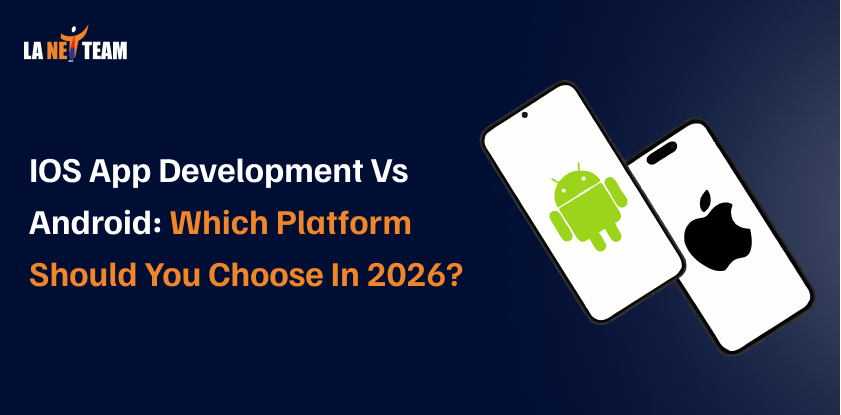Have you ever noticed how some apps launch on iOS first…. while some others appear on Android? It’s not by chance, it’s because each platform has its own type of USERS.
In fact, as per Statista reports, Android holds 70% of the global market share in mobile devices, whereas Apple’s iOS has 27%. Therefore, big brands like Facebook, Instagram, and TikTok often launch updates on iOS first.
On the other hand, Amazon and Netflix focus on Android to reach a wider audience worldwide. Hence, the choice of platform can make a significant difference. But….
Many beginners make this mistake of picking a platform, which later on leads to huge costs. If you want your app to stand out in 2026, know more about the platforms.
What Is iOS App Development?

iOS App Development is about creating applications specifically for Apple devices. Such as iPhones, iPads, and Apple Watches.
It is for the premium segment of users who typically spend more and engage longer with the applications.
Learn more about the Mobile App Development Process to understand how these apps are built efficiently.
The Type of Users You Get With iOS (And Why It Matters)
Knowing the users of iOS can help you decide if iOS is the right platform for your app.
Higher Income users
iOS users make 40% more income as compared to Android users. These users are willing to spend on apps that improve productivity or offer exclusive services.
Business users
Around 73% of business users in the USA use iOS. If your app is made for professionals/companies, choosing iOS is a great platform.
Young professionals (18 – 34)
Nowadays, iOS is very popular among younger people, especially in cities. As per the data, iOS captures around 61% of the urban US market in the 18 to 34-year age range.
These users are more active on apps that help with lifestyle, work, and entertainment.
Users live in big cities
Wealthy US cities such as San Francisco, New York, and Austin are 60% dominated by iPhone users.
What iOS App Actually Costs (The Real Numbers in 2026)
Here’s a simple way to understand what you’ll spend if you go for iOS:
1. Making the app (Development cost)
Building a professional iOS app usually costs $80,000 to $250,000, depending on the complexity. This cost covers designing the app, coding it in Swift, connecting to servers, and testing it.
👉Read more: Custom Mobile App Development
2. Apple Developer fee
$99 per year for an account, where you can see analytics, test the app, and put the app on the App Store.
3. Keeping the App updated (Maintenance)
This is the mandatory cost as Apple keeps bringing updates. It might cost you 15% to 20% of your original cost every year.
4. App Store Fees
When you launch the app on the ‘APP STORE’, Apple takes a part of your earnings. Especially when you are offering a subscription to the users.
Let’s say if you are offering a subscription via app, then Apple takes 30% of the amount you make in the first year. After the first year, they come down to 15%.
Did You Know
If your business makes less than $1 million in revenue per year, Apple charges just 15% from the start, even in the 1st year.
What Is Android App Development?

Android App Development is about creating applications for the Google Ecosystem. Such as smartphones, tablets, smartwatches, and even TVs running Android.
The Type of Users You Get With Android (And Why It Matters)
More-budget friendly users
Android has a larger share of users in lower-income brackets. People who use Android phones may have a more diverse range of incomes, so if your app is aimed at a broad audience or offers free services, Android is a great choice.
Global reach
Android phones are more affordable and available in more countries than iPhones. In fact, Android has a bigger market share worldwide, especially in countries like India, Brazil, and China. If your goal is to reach a global audience, Android gives you that advantage.
Diverse Age groups
While Android is used by all age groups, it’s especially popular among younger people and first-time smartphone users. If your app targets a wider, varied audience. Including people in developing regions, Android will give you more users.
Less wealthy regions
While iOS dominates in affluent markets like the U.S. and Western Europe, Android holds a bigger share in less wealthy regions. So, if you want to target countries where people spend less on smartphones, Android is key.
What Android App Actually Costs (The Real Numbers in 2026)
Here’s the breakdown of the real costs you should consider:
Development Cost:
| Basic App | Medium App | Complex App |
|---|---|---|
| $20,000 to $50,000 | $50,000 to $150,000 | $150,000 to $500,000 or more |
Google Play Store Developer Account:
This includes one-time fees, which are $25. It is lower than the $99/year fee for the Apple App Store.
Design Costs
Good design is key to a successful app. Professional UI/UX design for an Android app can cost anywhere from $5,000 to $20,000, depending on complexity and how polished you want it to look.
Backend Development & Server Costs
If your app needs a backend, this can range from $5,000 to $30,000.
Maintenance & Updates
Annual Maintenance: After your app is live, you’ll need to keep it updated with new features, bug fixes, and security patches. Maintenance usually costs about 15% to 20% of your initial development cost per year.
Quick Comparison: iPhones vs Android Side By Side

| Basis of Comparison | iphone Apps | Android Apps |
|---|---|---|
| Users in America | 45% | 55% |
| Users in the World | 27% | 71% |
| How much do users earn | $83,000 | $53,000 |
| Cost to build | $83,000 to $250,000 | $70,000 to $200,000 |
| Time to build | 4 to 6 months | 4 to 7 months |
| Computer language | Swift | Kotlin |
| What suystem do you need | Must be MAC | Any devices |
| How Fast Does Store Approve | 1 to 2 days | A few hours to 1 day |
| Money per user | $138 per year | $47 per year |
If you’re considering building for both platforms simultaneously, without maintaining two separate codebases. Explore Flutter vs React Native to build apps.
iOS App development vs Android: Which one to choose in 2026
Finally, the wait is over for getting to know which platform you should choose in 2026. The decision really depends on who your customers are and what matters most for your business.
Here’s a quick guide to help you decide:
When you should choose iPhone First
1. You’re targeting businesses
Most companies in the USA are iPhone users. In fact, about 73% of business phones are iPhones. A 2024 Forrester study found that 82% of B2B app deals require iOS as a must-have platform. So, if you’re selling to businesses, start with the iPhone.
2. You’re charging higher prices
iPhone users are 3 times more likely to pay for premium plans or subscriptions above $50 per month. If your app is a bit pricey, then there’s a high chance that iPhone users will likely buy it.
3. Your customers are in big cities
Cities like San Francisco, New York, and Boston are dominated by iOS users. For example, 71% of users in Manhattan are on iPhones. If your target market is in high-income, tech-savvy urban areas, building your app for iOS first makes far more sense.
4. You care about great design
Apple’s ecosystem is built around aesthetics and fluid experiences. If your app’s success depends on slick design or brand image, iOS is ideal. A 2024 Nielsen Norman Group study showed that iPhone users value design quality 38% more than Android users.
5. You want to launch the design
Apple offers a cleaner testing environment with fewer devices to manage. That means less debugging, fewer screen size issues, and a simpler publishing process. According to Mobile Dev Memo, iOS MVPs launch 31% faster on average than Android projects.
6. You rely on subscriptions
If recurring revenue is your core business model (like fitness, finance, or education apps), build for iPhone. Recurly’s 2024 data revealed that iOS subscriptions retain 78% of users annually, compared to 54% on Android, a significant revenue difference over time.
When you should choose Android
1. Want more downloads
When it comes to connecting with a larger audience, Android wins. With 2.5 billion devices worldwide, you can get more downloads.
Apps on Google Play average 4.2 times more downloads than Apple App Store in the first 90 days, according to Sensor Tower.
2. Targeting global users
Planning to reach India, Brazil, or Africa? You need Android. In growth markets, Android is basically the only game in town. According to IDC, 91% of smartphone sales in emerging markets are Android devices.
3. You are on a tight budget
Android development can cost 20–30% less upfront. Particularly since any laptop can be used for development, and Google’s Play Store only charges a $25 one-time fee. In contrast, Apple’s developer program charges $99 per year.
4. Want more flexibility
Android gives developers more control and allows greater access to device hardware (like NFC, Bluetooth APIs, and background tasks).
If your app depends on deep hardware integration or unique features that Apple might restrict, Android is more flexible.
5. You want a diverse Audience
Android users come from all backgrounds. Such as young, old, city, or rural areas. This helps you test your idea across many types of customers before scaling up.
Conclusion
In the end, it all depends on what you want from your app. If you are going after users who live in cities, earn well, and don’t mind paying more, iOS is the better choice. But if your goal is to reach as many people as possible worldwide, Android gives you that wider hand.
The two platforms are just excellent in their respective ways, with iOS providing you with loyal customers and seamless designs, and Android with an extensive reach and a reduced price.
Before you get to building your app, just ask yourself, who will you serve, and how far will you go? Once you know that, your answer will be clear.
If you’re considering building browser-based solutions alongside your mobile strategy, learn more about Web Application Development. Web apps complement your mobile presence and reach users across all devices.
